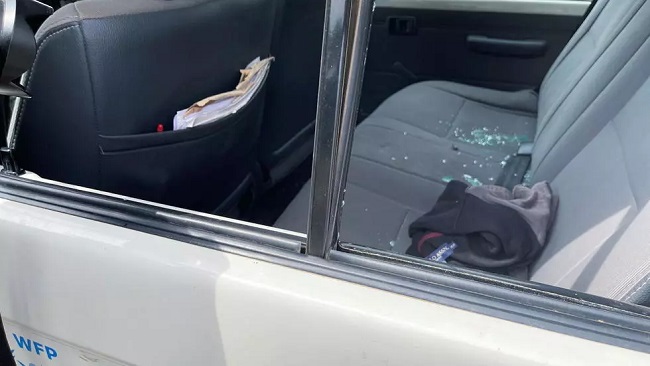Hutu rebels deny killing Italian ambassador, accuse DR Congo and Rwanda
Rwandan Hutu rebels on Tuesday denied accusations they were behind the killing of the Italian ambassador to the Democratic Republic of Congo (DRC) and instead blamed the armies of the DRC and Rwanda, as further details emerged about the attack.
Luca Attanasio, 43, died on Monday after a World Food Programme (WFP) convoy was ambushed in a dangerous part of eastern DRC.
The envoy’s Italian bodyguard, Vittorio Iacovacci, and a Congolese driver who has not been identified also died on the field trip.
The DRC’s interior ministry on Monday blamed the killings on “members of the Democratic Forces for the Liberation of Rwanda (FDLR)” — a Rwandan Hutu rebel group that has plagued the region for more than a quarter of a century.
The group however denied the accusations. “The FDLR declare that they are in no way involved in the attack,” the rebel group said in a statement on Tuesday, condemning what it called a “cowardly assassination”.
The FDLR instead blamed the Rwandan army and the Armed Forces of the Democratic Republic of the Congo (FARDC) for the attack in a statement received by AFP Tuesday
It said the ambassador’s convoy was attacked near the Rwandan border, “not far from a position of the FARDC”.
“The responsibility for this despicable killing is to be found in the ranks of these two armies and their sponsors who have forged an unnatural alliance to perpetuate the pillaging of eastern DRC,” it said.
The FDLR called on Kinshasa and UN peacekeeping force MONUSCO to “shed light” on the killings “instead of resorting to hasty accusations”.
The DRC and Rwanda authorities have not reported the presence of any regular Rwandan troops in the DRC.
The FDLR was founded by senior Rwandan officers and militiamen who the UN and others have said helped orchestrate the 1994 genocide in neighbouring Rwanda. It is one of around 120 armed groups operating in eastern Congo.
The group kidnapped two British tourists in the same village in May 2018 and held them for several days before freeing them.
The surrounding Virunga National Park, which lies along the DRC’s borders with Rwanda and Uganda and is home to more than half the world’s mountain gorillas, then closed for nine months.
Italy repatriates bodies
Meanwhile Italy on Tuesday began repatriating the bodies of the Italian victims of the attack.
In the eastern city of Goma, a UN van transported Attanasio and Iacovacci’s bodies to the airport, where an Italian cargo plane had landed early in the afternoon to fly the bodies to Rome.
Congolese President Felix Tshisekedi had dispatched his top diplomatic adviser to Goma to support an investigation by local authorities, the presidency said Tuesday.
Dangerous region
Monday’s attack occurred north of the North Kivu capital of Goma on National Highway 2, a road that runs through thickly forested, mountainous terrain near the porous border with Rwanda.
The world-renowned Virunga National Park, a UNESCO-listed wildlife reserve, straddles the area.
Tshisekedi’s office said Attanasio had arrived in Goma on Friday morning aboard a MONUSCO plane.
He left on Monday morning in a two-vehicle WFP convoy heading for Kiwanja, in the Rutshuru area, accompanied by his bodyguard and WFP workers, it said.
The convoy was ambushed three kilometres (1.8 miles) from their destination by six assailants, armed with five AK-47 assault rifles and a machete.
“They proceeded by firing warning shots before forcing the people in the vehicles to get out and follow them into the depths of the (Virunga) park, which they did by shooting dead one of the drivers to create panic,” the president’s office said.
Park rangers and army troops nearby heard the noise and pursued the attackers.
“Five hundred metres (from the site of the ambush), the kidnappers fired point blank at the bodyguard, who died on the spot, and at the ambassador, hitting him in the abdomen,” the presidency said.
Security questions
After the Italian government expressed shock and outrage at the attack, newspapers in Rome on Tuesday raised questions about security preparations for the trip.
The DRC interior ministry said in a statement on Monday that the security services and provincial authorities had not been given advance warning of the trip.
“(They) were unable to provide special security for the convoy or come to its aid because of a lack of information about their presence in this part of the country, despite its reputation for instability,” it said.
But the WFP in a statement said the attack “occurred on a road that had previously been cleared for travel without security escorts”.
A UN humanitarian official in the DRC, who spoke on condition of anonymity, said that this meant the convoy had to be a minimum of two vehicles.
(FRANCE 24 with AFP and REUTERS)





